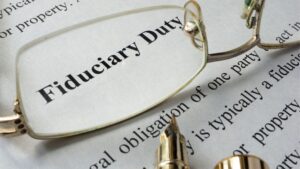
Most people need to trust professionals to handle certain financial and legal matters. When things go well, these relationships can be extremely beneficial to everyone involved. However, with this trust comes a level of vulnerability. When the trust is violated, it can have severe ramifications for the victim.
Some professionals have so much power over their clients’ financial matters that the law imposes special duties upon them. These are called fiduciary duties, and the professionals are known as fiduciaries. When a fiduciary violates one of their duties, victims can hold them accountable and recover compensation.
Understanding what damages are available for breach of fiduciary duty is critical to holding fiduciaries accountable for their improper actions. In general, damages are designed to compensate victims for their losses due to the fiduciary’s breach. In some cases, damages can go beyond the losses suffered by the victim and allow victims to claw back illicit gains made by their fiduciary.
At the Law Offices of Andrew M. Lamkin P.C., we know how to make victims whole after a fiduciary’s breach harms them. Our skilled team has the experience to recover damages for victims through a settlement and to take perpetrators to court when necessary. We have a proven track record of success and pride ourselves on fiercely advocating for our clients. Contact the Law Office of Andrew M. Lamkin today and schedule a consultation.
Breach of Fiduciary Duty
Fiduciary duties place specific legal requirements on professionals who maintain a particular position of trust with their clients. When a fiduciary relationship exists, clients can sue their fiduciary for damages when they fail to live up to their duties.
There are two ways to establish fiduciary relationships in New York. First, some professionals are deemed to be fiduciaries through state statutes or contracts. Second, a fiduciary relationship can be implied based on the nature of the relationship and the transactions being engaged in.
Breaches of fiduciary duty occur when a fiduciary violates a specific legal responsibility they must uphold. These duties include the duties of care, loyalty, and good faith.
Breach of Fiduciary Duty Damages
Different types of damages might be available to victims based on their fiduciary breach. Understanding how damages are proven in court once a plaintiff establishes a breach is also critical.
What Damages Are Available In Fiduciary Breach Cases?
Damages available for breach of fiduciary litigation differ based on the violations and the harm they cause. Common damages that victims can recover include:
- Unpaid benefits,
- Monetary damages,
- Lost profits,
- Unnecessary losses,
- Punitive damages,
- Any illicit gains made by the fiduciary, and
- Other economic harms experienced by the victim.
An experienced attorney can help you determine what specific damages might be available in your case.
Proving Damages After a Breach of Fiduciary Duty
If a case goes to litigation, plaintiffs must have a solid grounding for all damages to receive compensation. Plaintiffs can use physical evidence, such as business records and receipts, to prove damages. Witness testimony and experts also go a long way toward proving the existence of any injuries in court.
Beyond proving the existence of damages, plaintiffs must also show that the fiduciary’s breach caused the injuries.
Typically, damages are limited to what is necessary to compensate the victim for their losses. However, punitive damages may also be available in limited circumstances. To receive punitive damages, plaintiffs usually must prove that malice, fraud, or complete disregard for the consequences of the fiduciary’s actions were involved in the fiduciary’s breach. Though compensation for punitive damages can be considerable, New York courts rarely award them.
Types of Fiduciary Duty
There are several different types of fiduciary duties that professionals can be held to in New York. Proving a breach of fiduciary duty involves identifying which responsibility the fiduciary violated.
Duty of Care
The duty of care requires that each fiduciary act with the same care and caution that a reasonably prudent person would under similar circumstances. This standard is judged based on the circumstances of the fiduciary’s actions in the context of the underlying fiduciary relationship. Different fiduciaries can be held to different standards. For example, the standard a medical doctor would be held to in the context of surgery differs from the standard a financial advisor would be held to.
Duty of Loyalty
The duty of loyalty requires fiduciaries to act in the best interests of their clients. Doing so involves putting a client’s interest above everyone else’s, including the fiduciary’s own. Thus, the duty of loyalty also requires fiduciaries to disclose potential conflicts of interest to their clients and mitigate them whenever possible.
Duty of Good Faith
The duty of good faith requires that fiduciaries act honestly in all their dealings with their clients and make decisions that they honestly believe are in their client’s best interests. Part of upholding this duty is being honest with clients and disclosing material facts to them as soon as possible.
Other Duties
In some contexts, fiduciaries might have additional duties. For example, corporate directors must avoid causing their corporation to violate the law. An experienced attorney can help you understand what duties a fiduciary might owe you.
Should I Hire an Attorney?
Breach of fiduciary duty claims are almost always legally complicated and evidence intensive. Working with an experienced attorney can substantially increase your chances of success. At the Law Offices of Andrew M. Lamkin, we are committed to helping clients protect their finances and plan for the future. Contact us today if you are thinking of pursuing a breach of fiduciary duty claim.
Frequently Asked Questions
How Long Do I Have to File a Breach of Fiduciary Duty Claim?
The statute of limitations for a breach of fiduciary duty claim in New York depends on whether the fiduciary’s actions are criminal. In the case of a non-criminal violation, victims generally have three years from the time they discover the breach to file a lawsuit. Victims alleging a criminal offense usually have six years to file a lawsuit in New York. However, determining the statute of limitations in a given case is sometimes not as straightforward as it seems. Consulting an experienced lawyer is recommended.
When Should I File a Breach of Fiduciary Duty Claim in Court?
An experienced lawyer can help you determine when to file a lawsuit. Most tort cases in New York are settled out of court; in many cases, formally filing a lawsuit is unnecessary. An attorney can advise you on the best litigation strategy for your particular case. Contact us today.


